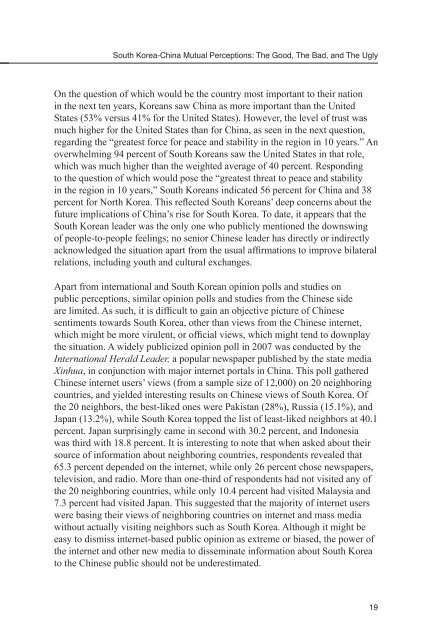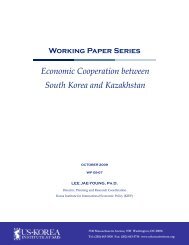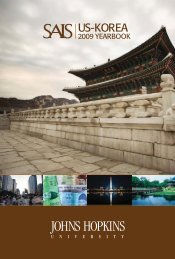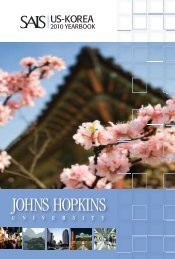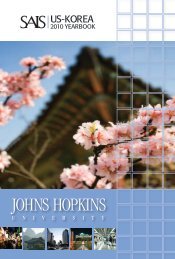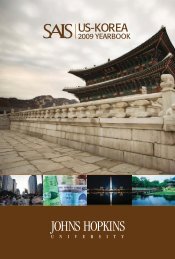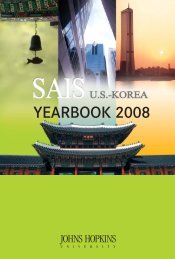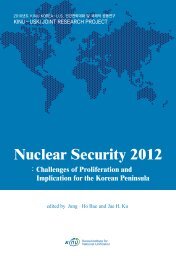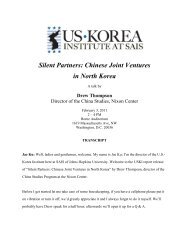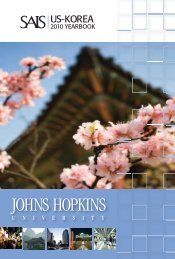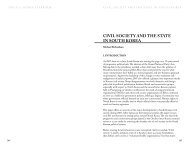US-Korea Institute at SAIS
US-Korea Institute at SAIS
US-Korea Institute at SAIS
- No tags were found...
You also want an ePaper? Increase the reach of your titles
YUMPU automatically turns print PDFs into web optimized ePapers that Google loves.
South <strong>Korea</strong>-China Mutual Perceptions: The Good, The Bad, and The Ugly<br />
On the question of which would be the country most important to their n<strong>at</strong>ion<br />
in the next ten years, <strong>Korea</strong>ns saw China as more important than the United<br />
St<strong>at</strong>es (53% versus 41% for the United St<strong>at</strong>es). However, the level of trust was<br />
much higher for the United St<strong>at</strong>es than for China, as seen in the next question,<br />
regarding the “gre<strong>at</strong>est force for peace and stability in the region in 10 years.” An<br />
overwhelming 94 percent of South <strong>Korea</strong>ns saw the United St<strong>at</strong>es in th<strong>at</strong> role,<br />
which was much higher than the weighted average of 40 percent. Responding<br />
to the question of which would pose the “gre<strong>at</strong>est thre<strong>at</strong> to peace and stability<br />
in the region in 10 years,” South <strong>Korea</strong>ns indic<strong>at</strong>ed 56 percent for China and 38<br />
percent for North <strong>Korea</strong>. This reflected South <strong>Korea</strong>ns’ deep concerns about the<br />
future implic<strong>at</strong>ions of China’s rise for South <strong>Korea</strong>. To d<strong>at</strong>e, it appears th<strong>at</strong> the<br />
South <strong>Korea</strong>n leader was the only one who publicly mentioned the downswing<br />
of people-to-people feelings; no senior Chinese leader has directly or indirectly<br />
acknowledged the situ<strong>at</strong>ion apart from the usual affirm<strong>at</strong>ions to improve bil<strong>at</strong>eral<br />
rel<strong>at</strong>ions, including youth and cultural exchanges.<br />
Apart from intern<strong>at</strong>ional and South <strong>Korea</strong>n opinion polls and studies on<br />
public perceptions, similar opinion polls and studies from the Chinese side<br />
are limited. As such, it is difficult to gain an objective picture of Chinese<br />
sentiments towards South <strong>Korea</strong>, other than views from the Chinese internet,<br />
which might be more virulent, or official views, which might tend to downplay<br />
the situ<strong>at</strong>ion. A widely publicized opinion poll in 2007 was conducted by the<br />
Intern<strong>at</strong>ional Herald Leader, a popular newspaper published by the st<strong>at</strong>e media<br />
Xinhua, in conjunction with major internet portals in China. This poll g<strong>at</strong>hered<br />
Chinese internet users’ views (from a sample size of 12,000) on 20 neighboring<br />
countries, and yielded interesting results on Chinese views of South <strong>Korea</strong>. Of<br />
the 20 neighbors, the best-liked ones were Pakistan (28%), Russia (15.1%), and<br />
Japan (13.2%), while South <strong>Korea</strong> topped the list of least-liked neighbors <strong>at</strong> 40.1<br />
percent. Japan surprisingly came in second with 30.2 percent, and Indonesia<br />
was third with 18.8 percent. It is interesting to note th<strong>at</strong> when asked about their<br />
source of inform<strong>at</strong>ion about neighboring countries, respondents revealed th<strong>at</strong><br />
65.3 percent depended on the internet, while only 26 percent chose newspapers,<br />
television, and radio. More than one-third of respondents had not visited any of<br />
the 20 neighboring countries, while only 10.4 percent had visited Malaysia and<br />
7.3 percent had visited Japan. This suggested th<strong>at</strong> the majority of internet users<br />
were basing their views of neighboring countries on internet and mass media<br />
without actually visiting neighbors such as South <strong>Korea</strong>. Although it might be<br />
easy to dismiss internet-based public opinion as extreme or biased, the power of<br />
the internet and other new media to dissemin<strong>at</strong>e inform<strong>at</strong>ion about South <strong>Korea</strong><br />
to the Chinese public should not be underestim<strong>at</strong>ed.<br />
19


